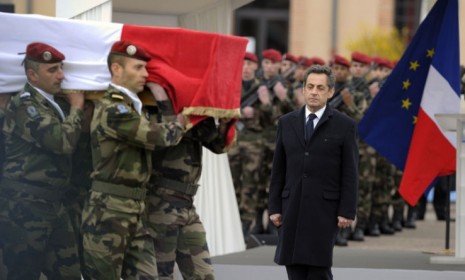France's deadly Toulouse shootings: Blame anti-immigrant rhetoric?
After several Muslims and Jews are murdered, critics wonder if Nicolas Sarkozy ought to tone down France's inflammatory debate on multiculturalism

A free daily email with the biggest news stories of the day – and the best features from TheWeek.com
You are now subscribed
Your newsletter sign-up was successful
A string of shootings by a lone gunman in the city of Toulouse, France, has left seven people dead — three Jewish schoolchildren, a rabbi, and three Muslim paratroopers — and is igniting a debate over whether the anti-immigrant rhetoric of France's presidential candidates is to blame. President Nicolas Sarkozy, facing a tough re-election battle, has been striking a strong nationalist tone in an attempt to match the inflammatory far-right candidate Marine Le Pen, suggesting that Muslim immigrants should work harder to integrate into French culture, and not expect any special treatment from the government. But the extreme tone and positions of the debate has led to a "growing climate of intolerance," says centrist presidential candidate Francois Bayrou, which may be encouraging violence. With the revelation Wednesday that the suspected gunman is not a far-right radical, but a Muslim who claims ties to al Qaeda, the debate is becoming even more heated. Is anti-immigrant rhetoric to blame for the killings in Toulouse?
France's anti-immigrant hysteria has grown dangerous: France isn't sliding headlong "into an abyss of ethnocentric, racially, or politically motivated violence," says William Bauer at Policy Mic. But the attacks do show that the "increasingly angry war of words in French politics" is more damaging than ever, and has life-and-death consequences. Increasingly, anti-immigration rhetoric is a successful tool to woo conservative voters who fear change — but the "reckless use of inflammatory language" is exceedingly dangerous. Some people will always exploit such discourse and differences "to justify their heinous acts."
"France Jewish school shooting shows French politicians must stop using anti-immigrant rhetoric"
The Week
Escape your echo chamber. Get the facts behind the news, plus analysis from multiple perspectives.

Sign up for The Week's Free Newsletters
From our morning news briefing to a weekly Good News Newsletter, get the best of The Week delivered directly to your inbox.
From our morning news briefing to a weekly Good News Newsletter, get the best of The Week delivered directly to your inbox.
Actually, terrorism is to blame: The suspect is an Islamist extremist, not a far-right radical, proving that the murders aren't products of France's "climate of intolerance," says Sanya Khetani at Business Insider. This was terrorism, plain and simple. And it may actually increase harsh rhetoric against minorities: Marine Le Pen's Front National party has declared that France should interpret the attacks as cause to wage war against "these fundamentalist political and religious groups that are killing our children."
"How Nicolas Sarkozy and Marine Le Pen could end up gaining from the French shooting tragedy"
Either way, Sarkozy wins: When everyone thought the shooter was a far-right racist, Sarkozy was taking heat for not-so-subtly bashing France's growing Muslim population, says Gavin Hewitt at BBC News. But now that the suspected killer turns out to be a terrorist, Sarkozy gets off scot-free, and is receiving rapturous reviews for his cool handling of the crisis. Rather than having to apologize for incendiary remarks that might have sparked violent actions from a far-right radical, he gets to shine as "a man of action and decision in a crisis." Don't expect him to tone down his rhetoric anytime soon.
"France gunman 'set to kill again'"
A free daily email with the biggest news stories of the day – and the best features from TheWeek.com